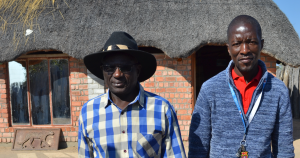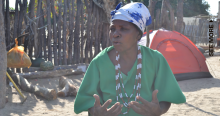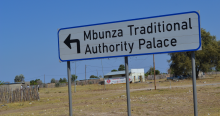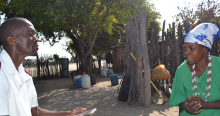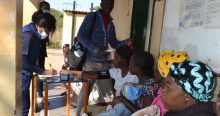Covid-19: How traditional leaders drove up vaccination rates in Namibia’s northern region
“I was the first person to get vaccinated in this entire village.” These are the words of Hompa (Chief) Alfons Kaundu of the Mbunza Traditional Authority in Kavango West, who met with a team from WHO Namibia in Sigone village to reflect on COVID-19 in the region.
He chuckles as he narrates how villagers were scared to get vaccinated against COVID-19, thinking the vaccine would kill them.
“People were saying the leaders should get vaccinated first and when they saw that I had no reaction they also followed,” says Kaundu.
After getting vaccinated, the chief told his entire clan to also get vaccinated.
“I had to lead by example, so I took my whole family to get vaccinated. I also took the headmen and women in the area under my jurisdiction to get vaccinated,” he adds.
Kaundu says he also got the second dose of the COVID-19 vaccine to further prove the safety and efficacy of the COVID-19 vaccines.
In addition to asking his clan to get vaccinated, the chief regularly visited various vaccination points to calm the nerves of those who were ready to be inoculated.
He also went from homestead-to-homestead encouraging people to get vaccinated.
“The villagers were not resistant to getting vaccinated. The misinformation and concerns were fueled mostly by the educated people who live in towns and come home during holidays,” explains Kaundu.
Before the roll-out of the COVID-19 vaccines, Kaundu also went from village to village, holding meetings and talking to villagers about protecting themselves from contracting COVID-19.
He also bought tippy taps so that people coming for hearings could wash their hands before and after entering the traditional court.
“I always bought masks and sanitizers in bulk, and I would give them to people who needed them. I still keep masks and hand sanitizers in my car,” says the 67-year-old traditional leader.
Kaundu says the Namibian Government did a good job sensitizing traditional leaders about COVID-19.
The Government worked with traditional leaders to spread accurate information about COVID-19. Kaundu notes that this method was effective at the community level because of the trust constituents have in their traditional leaders.
“The Ministry of Health and Social Services was effective in sharing the news about how COVID-19 is spread and also how to prevent it. That helped us with identifying the false news spreading in our communities because some political parties and churches were against people getting vaccinated,” Kaundu says.
He further adds: “Some churches were operating even during lockdown so I would go from community to community to encourage people to adhere to COVID-19 regulations”.
Meanwhile, Regina Nakale, the headwoman of the Masivi village in Ncamagoro district agrees that the Namibian Government’s response throughout the COVID-19 pandemic and especially during its peak, is commendable.
“With the assistance of the chiefs and healthcare workers, especially community health workers, we were able to give out a lot of information on COVID-19 at the grassroots level. Without that information on how to prevent COVID-19, how to identify COVID-19 symptoms and the availability of the vaccine, many people would have died,” says Nakale.
The traditional leaders in Kavango West were dedicated to seeing that the correct information was delivered to the people. They explored all available means to communicate to the public about this “new disease”, says Nakale.
“At first, we were concerned about this new disease and questioned its origin. But through the radio and the community health workers who walked from house to house we received the correct information. Our chiefs were also dedicated to seeing that the correct information was disseminated. Also, when people saw others dying, they knew that getting vaccinated would save their lives,” says Nakale who is a trained nurse.
She says her background in nursing came in handy because she is constantly reminding people in her household to maintain good hand hygiene. “This helped us a lot when we heard about COVID-19,” she adds.
Nakale and other traditional leaders convened community meetings specifically to spread information about COVID-19.
Daniel Haufiku, the Acting Primary Health Care Supervisor in Kavango West region says the fact that Kavango West is 99 percent rural made it easy to encourage communities to get vaccinated.
They used traditional leaders including Kaundu and Nakale as well as the local radio station, Wato FM to teach communities about COVID-19 in the initial stages of the pandemic, notes Haufiku.
“We moved from house to house during our visits and we identified areas where hesitancy was high and then devised strategies to reach them with the correct message,” adds Haufiku.
The youth and teachers were the hardest to convince, says Haufiku, adding that because they have access to the world wide web, they were more exposed to false information about COVID-19.
Despite limited resources such as a shortage of vehicles to access hard to reach areas, Kavango West still reached a high number of people with the correct information.
So far 31, 115 people in Kavango West are inoculated with their first dose of the COVID-19 vaccine. A further 12 ,874 people received their second dose while 6, 791 received booster doses, according to data from the Directorate of Health in Kavango West.
The Kavango West region has a population of 92,239,00 of which 57,210 (70%) adults were targeted to be eligible for the COVID-19 vaccination. A total of 9,139 adults were fully vaccinated by October 2021.
Before the determined interventions by the traditional leadership in June 2023, 16% were fully vaccinated.
Following the interventions, the total of fully vaccinated increased from 9,139 to 32,200 (56%) representing an increase of 40%.
This is due to collaborative efforts between government, partners such as WHO Namibia and Recon Africa and traditional authorities, says Eleotheria Nangura Thipungu, who at the time of the WHO visit was Acting Director of Health for Kavango West.
WHO Namibia invested NAD 4.1 million for the rollout of COVID-19 vaccines to 11 regions in the country, according to the WHO 2020/2021 Biennial report.
“We had a team of healthcare workers that visited the traditional palace. That really helped us very much with the dissemination of the correct information and with encouraging people to get vaccinated,” said Thipungu.
Also, a team of health workers and police officials was stationed at various points of entry, including the Katwitwi border post.
Meanwhile, WHO’s Health Promotion and Social Determinants Officer, Celia Kaunatjike explains that through a multisectoral approach, interventions at the start of the pandemic and throughout were extensive.
WHO Namibia funded community-based health workers, says Kaunatjike.
These community health workers were volunteers through the Namibia Red Cross Society (NRCS) while others were attached to the Ministry of Health and Social Services.
They were recruited to increase the community-based workforce, and subsequently increase coverage and thus spread the correct information at the community level, Kaunatjike explained.
These community health workers were trained on how to address concerns about COVID-19 and they focused extensively on prevention measures during house visits.
“They were trained on what to say, how to respond to certain questions and if they encountered difficult questions around COVID-19, they knew how to respond,” Kaunatjike explains.
These efforts, adds Kaunatjike, were to intensify communication around COVID-19. These efforts certainly paid off in Kavango West region, notes Thipungu.
“When you walk around in the community, especially now in the winter, you will see people wearing their masks at public gatherings. Also, our people still want to be vaccinated,” said Thipungu.
